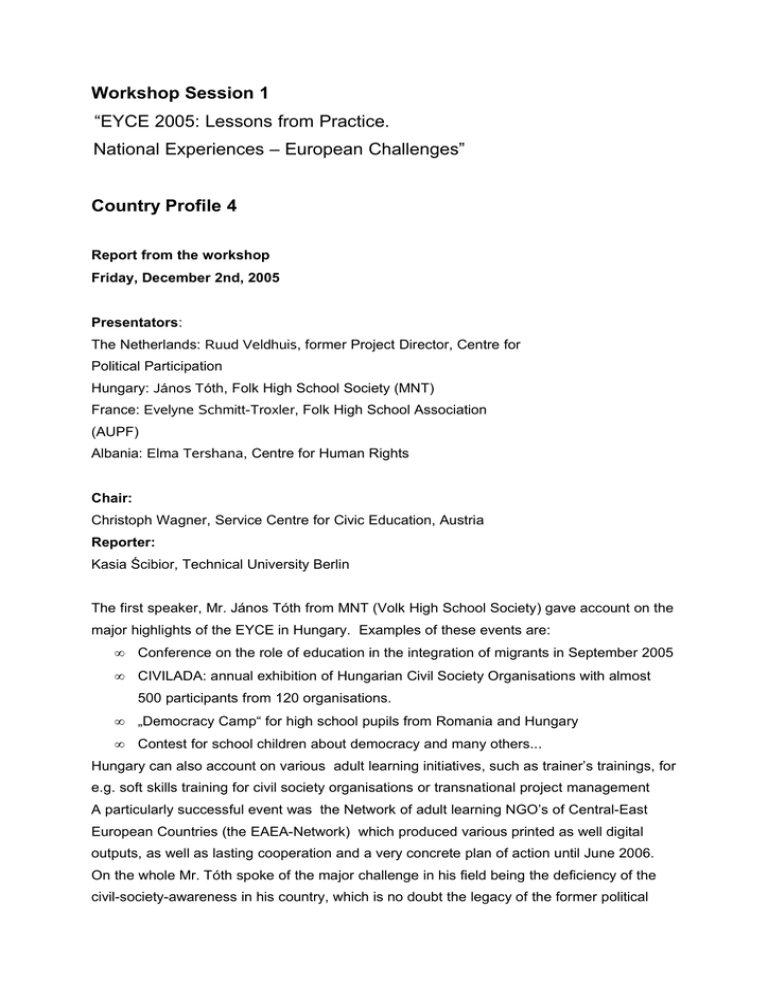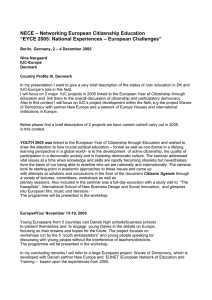Workshop Session 1 Country Profile 4 “EYCE 2005: Lessons from Practice.
advertisement

Workshop Session 1 “EYCE 2005: Lessons from Practice. National Experiences – European Challenges” Country Profile 4 Report from the workshop Friday, December 2nd, 2005 Presentators: The Netherlands: Ruud Veldhuis, former Project Director, Centre for Political Participation Hungary: János Tóth, Folk High School Society (MNT) France: Evelyne Schmitt-Troxler, Folk High School Association (AUPF) Albania: Elma Tershana, Centre for Human Rights Chair: Christoph Wagner, Service Centre for Civic Education, Austria Reporter: Kasia Ścibior, Technical University Berlin The first speaker, Mr. János Tóth from MNT (Volk High School Society) gave account on the major highlights of the EYCE in Hungary. Examples of these events are: • Conference on the role of education in the integration of migrants in September 2005 • CIVILADA: annual exhibition of Hungarian Civil Society Organisations with almost 500 participants from 120 organisations. • „Democracy Camp“ for high school pupils from Romania and Hungary • Contest for school children about democracy and many others... Hungary can also account on various adult learning initiatives, such as trainer’s trainings, for e.g. soft skills training for civil society organisations or transnational project management A particularly successful event was the Network of adult learning NGO’s of Central-East European Countries (the EAEA-Network) which produced various printed as well digital outputs, as well as lasting cooperation and a very concrete plan of action until June 2006. On the whole Mr. Tóth spoke of the major challenge in his field being the deficiency of the civil-society-awareness in his country, which is no doubt the legacy of the former political system. On the other hand, however, he referred to the current developments as the „renaissance of the civil society in Hungary“. The second spokesperson Mme Evelyne Schmitt-Troxler on behalf of the French Folk High School Association spoke of 2005 as an extremely difficult year for the French civil society. Recent troubles, such as the rejection of the European Constitution or the dramatic events in the suburbs have reactivated the civil education debate far beyond the EYCE. Mrs Schmitt-Troxler described the current forms of citizenship education at French schools as in her eyes insufficient, and in fact, facing these recent events - even as a failure. Therefore the French Ministry of Education as well as several NGO’s are undertaking actions in the field of Citizenship Education, including programmes such as, among the others: • Folks University for Adults („University for Citizens“) • SEDIM, an internet platform for citizen education, aimed mostly at teachers • Creating networks for local communities According to Mrs. Schmitt-Troxler there are 3 main challenges for citizenship education in France:1. Involving the teenagers, 2. Including civic educations in immigration policies (which are at the moment unsatisfactory, eg. there is no free of charge French language teaching) and 3. The lifelong learning principle, which should be enforced by the planned a new law on lifelong learning . The Conference on Adult education „From the individual to the citizen“, held recently in Paris was the highlight of EYCE in France. Following the French contribution we had a heated discussion on the recent events in France within the context of citizenship education and education as a whole. Mrs. Elma Tershana spoke on behalf of the Albanian Centre for Human Rights (ACHR). First of all she explained the philosophy beyond the need for HRE in Albania. The fall of the communist ideology created a vacuum of values which needs to be filled with democracy, otherwise the brutal „nature laws“, such as vendetta or honour killing could take over. Later she introduced ACHR, the outstanding NGO based in Tirana. Its activities within the last 13 years covered various trainings, information meetings, publications as well as lobbing activities for human rights. The main agenda of the ACHR is the establishment of the country-wide infrastructure of Human Rights Promotion, including networks of teachers and grass root organisations. Mrs Tershana stressed the positive developments in her country over the last years, following the slowly but steady change of the peoples attitudes towards the citizen and human rights, especially on the local community level, which creates altogether „An optimistic landscape of changes“ in Albania. The discussion hereafter covered subjects such as the difficulties in implementation of EU regulations in less-developed countries. The last speaker Mr Ruud Veldhuis, a lifelong teacher of Civil Education and here representing the Dutch Centre of the Political Participation, gave a very brief revie his country’s policy on citizenship education. As the Netherlands political system makes attempts to turn away from the welfare statesystem, the government is increasingly promoting the model of an active (as opposed to the passiveness in a welfare state) citizen, who is more responsible for themselves and politically involved. The main outcome of this policy so far, was seen during the Dutch presidency of the EU-Commission last year, when the Dutch Ministry of Education designed a model EU-Programme to be taught at school, under the name „Citizenship made in Europe“ The main challenges for the future of citizenship education in the Netherlands can be seen in the integration of immigrants. At latest after the assassination of van Gogh, there is a broader demand for a new, harder policy on immigrants. At the same time there seems to be a consensus about the importance of citizenship education for the ethnical minorities or otherwise disadvantaged society groups. Oddly enough, however, the very same society groups are traditionally not being reached by civil society organisations. It could be observed that also in the Netherlands there is a big gap between the politics and how the society actually works. The Dutch government wants to compensate for these deficiencies in form of a new law which makes citizenship education, as well as, on an USAmerican model, the service for the society compulsive for primary schools. This measure can be described as the biggest success of EYCE in the Netherlands, although it must be mentioned that, similarly to France and probably many other European countries, this were other events and turbulent developments of the recent time not relied to EYCE which triggered this changes. Mr Veldhuis could have also accounted on many good-practice examples from the Dutch citizenship education field, but unfortunately the time was not sufficient. As the group consisted of four such profoundly different countries, the discussion did not produce any generalizing conclusions about the EYCE in these countries. Instead, there followed a discussion on such general subjects as the relationship of democracy and EDC (democracy has more to it than EDC) and the importance of teachers’ education and didactics. One important remark was that media-education deserves more attention, as we live in a media-ruled world and although we cannot change it, we should at least be aware of how it is created in order to view it critically -> „education to disobedience“.





